
Euphoria is a genus of scarab beetles in the subfamily Cetoniinae, the flower or fruit chafers. They are native to the Americas, where they are distributed from Canada to Argentina. They are most diverse in Mexico and Central America. As of 2012, there are 59 species in the genus.

Flower chafers are a group of scarab beetles, comprising the subfamily Cetoniinae. Many species are diurnal and visit flowers for pollen and nectar, or to browse on the petals. Some species also feed on fruit. The group is also called fruit and flower chafers, flower beetles and flower scarabs. There are around 4,000 species, many of them still undescribed.

Pachnoda is a genus of beetles from the subfamily Cetoniinae with nearly all of the species living in Africa. The limit of the genus is given by the presence of internal lobes in their aedeagi.
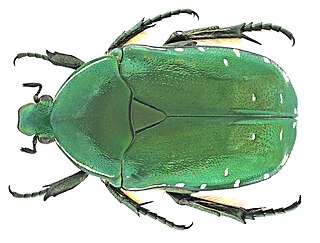
Rhabdotis is a genus of the family Scarabaeidae.
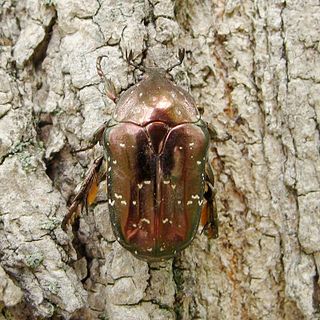
Protaetia is a genus of beetles of the family Scarabaeidae, occurring primarily in Asia, and containing over 300 species.

Trichostetha fascicularis is a large, metallic-green beetle found in South Africa.
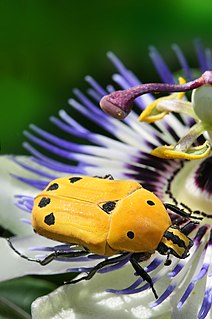
Euchroea is a genus of beetles of the family Scarabaeidae and subfamily Cetoniinae. It originates in Madagascar.

Taurhina is a genus of beetle belonging to the family Scarabaeidae. The name is frequently misspelled as Taurrhina following an unjustified spelling change by Kraatz in 1890.
Cotinis subviolacea is a species of the Cotinis scarab genus. It was described by Hippolyte Louis Gory and Achille Rémy Percheron in 1833. It is found in the United States.

Rhabdotis albinigra is a species of Scarabaeidae, the dung beetle family. It was described by Hermann Burmeister in 1847.
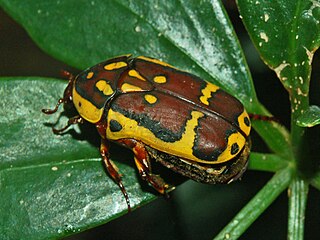
Pachnoda fissipunctum is an African scarab beetle in the subfamily Cetoniinae. It was originally described in 1885 as a variety of Pachnoda flavicollis.

Trichostetha is a genus of beetle in the scarab beetle family. It is endemic to southern Africa, and its species most commonly occur in mountainous terrain. The genus includes several species that have only recently been described, as well as many species lacking a description of any of the larval stages. Except for T. fascicularis and its subspecies, the species comprising Trichostetha have small ranges of distribution, frequently in the Cape Floral Region of South Africa.

Chondrorrhina abbreviata is a species of fruit and flower chafers belonging to the family Scarabaeidae, subfamily Cetoniinae.

Chondrorrhina is a genus of fruit and flower chafers belonging to the family Scarabaeidae, subfamily Cetoniinae.
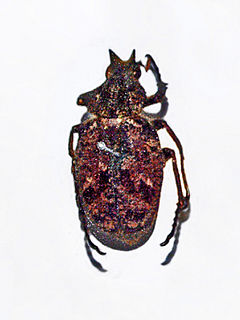
Inca is a genus of beetles belonging to the family Scarabaeidae.

Euphoria herbacea is a species of scarab beetle in Cetoniinae subfamily. It is 15–16 millimetres (0.59–0.63 in) long and is olive-green in color. It is endemic to the United States, especially to the Mississippi River.

Euphoria sepulcralis, the dark flower scarab, is a species of scarab beetle in the subfamily Cetoniinae. It is 9–11 millimetres (0.35–0.43 in) long and is brown in color. It is found in North America in countries such as Mexico and southern and Central United States.

Xeloma are beetles from the subfamily Cetoniinae, tribe Cetoniini. The genus contains thirteen recognised species found in various countries of Sub-Saharan Africa.
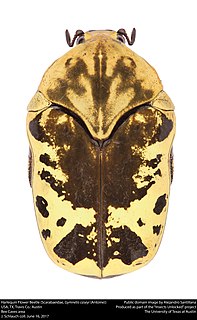
Gymnetini is a tribe of fruit and flower chafers in the family Scarabaeidae. There are 34 genera in Gymnetini, mostly New World.

Cetoniini is a tribe of fruit and flower chafers in the family of beetles known as Scarabaeidae. There are over 80 genera in Cetoniini.

















